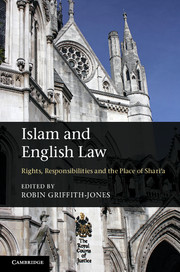Book contents
- Frontmatter
- Contents
- List of contributors
- List of abbreviations
- Preface
- Introduction
- Part I The Archbishop of Canterbury and shariʽa law
- Part II The Archbishop’s proposal for ‘transformative accommodation’
- Part III Responsibilities and rights
- Part IV Prospect: equality before God and before the law
- Select bibliography
- Index of cases
- Index
- References
Introduction
Published online by Cambridge University Press: 05 April 2013
- Frontmatter
- Contents
- List of contributors
- List of abbreviations
- Preface
- Introduction
- Part I The Archbishop of Canterbury and shariʽa law
- Part II The Archbishop’s proposal for ‘transformative accommodation’
- Part III Responsibilities and rights
- Part IV Prospect: equality before God and before the law
- Select bibliography
- Index of cases
- Index
- References
Summary
The Temple Church in London was built by the Knights Templar during the Crusades, a time of bitter division between Christian and Muslim cultures. Such a gulf may appear to be deepening again in our own time. It was therefore highly appropriate that the Church should have been the venue for a series of discussions on Islam and English law, set up to articulate, understand and, if possible, to begin to bridge, at one crucial point, the apparent chasm between the two cultures. Most of the chapters in this volume have their origin in those discussions; they have been transformed since by the authors themselves – to all of whom we have good reason to be grateful for the care and passion with which they have written. The book, although naturally focused on the UK, is offered as part of an ongoing conversation on topics of international concern; our contributors work in Canada, France, South Africa, the UK and USA.
The twentieth-century resurgence of Islam in some parts of the world is graphically described by Ali Allawi as follows:
Islam burst out of its confinement as an elemental, even inchoate force, flying in every direction and trying to seek its balance … Islam’s reappearance as a guiding principle in state and society obliged Muslims to confront a whole multitude of fundamental issues, which were covered up when the reins of power were in the hands of others.
At the same time, these fundamental issues have had to be confronted in other societies, particularly in Western Europe, which have a growing Muslim population. Britain now has more than two million people of Muslim origin. A society which had become predominantly secular, in which, in the words of the Indian writer Milinda Banerjee, modernity itself had become a religion, has had to face the need to accommodate those whose religious adherence today is as proud and profound as at any time in history.
- Type
- Chapter
- Information
- Islam and English LawRights, Responsibilities and the Place of Shari'a, pp. 1 - 6Publisher: Cambridge University PressPrint publication year: 2013

